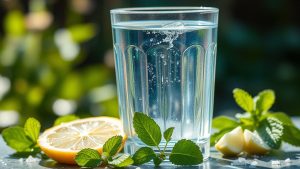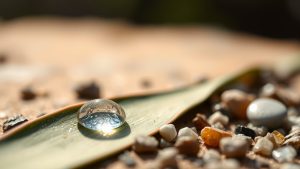
Sweet water taste means that drinking water has a flavor profile influenced by various factors. High mineral concentrations, like calcium and magnesium, can create sweetness, while aging plumbing materials may leach chemicals affecting taste. Contaminants, including algae or bacterial growth, can further complicate flavor profiles. Your recent food consumption and hydration level can also impact your perception of sweetness. Understanding these influences gives you insights into your water's quality and taste. Explore further for more details.
Sweet water taste can often perplex those who encounter it, as its origins are rooted in various chemical, biological, and environmental factors. You might notice that your water has a sweet taste, and this could be due to a high concentration of minerals like calcium and magnesium commonly found in groundwater. When these minerals dissolve in water, they can create a flavor profile that leans toward sweetness, especially if the water's pH is slightly above neutral. A pH greater than 7 can enhance this taste, making the water more appealing, although it may not always indicate purity.
You should also consider how plumbing materials affect water flavor. For instance, if your water travels through PVC or PEX pipes, these materials can leach chemicals into the water over time, potentially contributing to a sweet taste. Aging infrastructure, especially corroded metal pipes, can introduce rust particles, which might also add a hint of sweetness. The interaction between water and these materials can notably alter the flavor you experience.
Bacterial or algae contamination can further complicate the taste dynamics of your water. If water treatment processes fail to eliminate these contaminants, they may produce compounds that impart sweetness. In some cases, specific types of algae thrive in water sources, resulting in a flavor that might catch you off guard. Additionally, if local water providers add chlorine for disinfection, the chemical reactions involved can sometimes lead to unexpected flavor changes.
Human factors also play a role in how you perceive sweetness in your water. For instance, salivary amylase in your mouth breaks down starches into sugars, enhancing sweetness perception. If you've recently consumed sweet foods, residual sweetness may linger, making the water taste even sweeter. Dehydration can heighten your sensitivity to sweet flavors, as your body craves hydration, accentuating the sweet notes in your drink. Curiously, if you consume something bitter before drinking water, the contrast may cause the water to taste sweeter by comparison. Extreme thirst can heighten the perception of sweetness in water, leading to an intensified sweet taste experience.
Chemical contamination from industrial activities or agricultural runoff can also affect your water's flavor. If chemicals from nearby factories seep into water sources, they can introduce sweet-tasting compounds. Similarly, leaks in plumbing can release substances like ethylene glycol, which is known for its sweet taste, into your drinking water.
Understanding the quality of your water is essential. Well water, rich in minerals, often has a sweeter taste compared to municipal water. The presence of bicarbonate ions can suppress other tastes, making the water seem even sweeter. Filtering or purification treatments may not eliminate all minerals, potentially leaving you with a sweet taste.
Conclusion
In nature, sweet water taste embodies a nuanced blend of flavor and emotion, evoking memories and sensations that linger like a whispered secret. It's not just about the sweetness; it's about the experience it offers, a reminder of nature's delicate balance. Understanding this taste allows you to appreciate the subtleties in both food and life, urging you to savor each moment. So, the next time you encounter this flavor, let it wash over you like a gentle breeze, revitalizing and invigorating.



